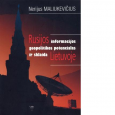
Original title: Rusijos informacijos geopolitikos potencialas ir sklaida Lietuvoje
Publishing date: 2008
Publisher: Vilniaus universiteto leidykla
Language: Lithuanian
Pages: 195
Description:
The Lithuanian information space – just like those of other post-Soviet countries – has become a kind of a testing range for Russian geopolitics of information. Based on the tradition of constructivism that treats the society’s identity as a part of national sovereignty, we can assert that Lithuania currently faces new threats which, although they gene rate a huge wave of public interest, have not as yet been analyzed by political scientists and are not fully understood. The book addresses the problem of understanding how modern Russia, having (mis)assessed the changes in the concept of power in the Information Age, uses information technologies and the media to retain (increase) its influence in the former Soviet space and specifically in Lithuania. It has the objective of analyzing Russia’s geopolitics of information and its dispersal in the Lithuanian information environment and of assessing its influence on the geocultural attitudes in Lithuanian society. […] The book presents, for the first time in Lithuania, a theoretical model of geopolitics of information, the results of an extensive empirical study of Lithuania’s information environment, and proposals of novel mechanisms to strengthen the society’s information security. the events in Estonia in 2007 have confirmed the need to study, consistently and continuously, Russia’s information policy. […] The first part of the book – Power Politics in the Information Age – presents a critical analysis of the concept of power. A special focus is made on the changes of space and power policy strategies in the Information Age. […].In part two – The Theoretical Context of Russia’s Geopolitics of Information – the concept of geopolitics of information and an analysis of its space, tools and strategies are presented. The theoretical model of geopolitics of information is set out which is later on applied in empirical studies. Geopolitics of information is defined as a policy based on the control of information flows and aggressive methods of psychological impact aimed at establishing dominance in a specific information space affecting the geocultural attitudes of a society for own benefit and motivating the political behaviour of individual persons. […] The book introduces a theoretical model of geopolitics of information which allows systematizing Russia’s actions in the Lithuanian information space. This model serves as a basis for the empirical studies carried out in this research. Empirical studies based on the theoretical model are singled out in part three: first, Lithuanian society’s information flows are analyzed with a special focus made on the scope of Russia’s informational penetration in Lithuania’s communication systems; second, specific cases of Russia’s information attacks are examined and the impact of such geopolitics of information on the geocultural attitudes in Lithuanian society is assessed. […]. [Excerpt]
Cite as: Maliukevičius, N. (2008) Rusijos informacijos geopolitikos potencialas ir sklaida Lietuvoje. Vilnius: Vilniaus universiteto leidykla.







